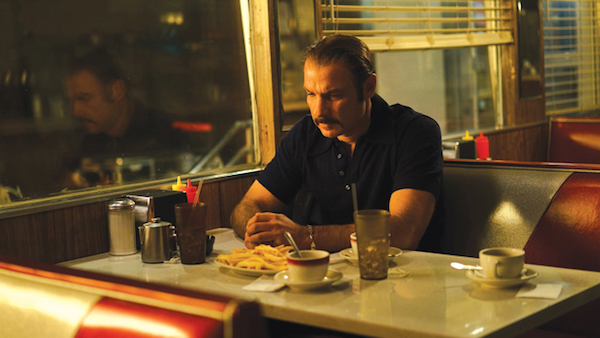
BATTERY DANCE: 41ST ANNUAL NEW YORK SEASON | Informed by interactions with artists and audiences during recent tours of Europe, Africa, South and East Asia, and the American Midwest, an invigorated Battery Park Dance touches down on the ground of its namesake neighborhood. Longtime company members will join forces with dancers from Iraq and Romania, composers from Syria and Tunisia, and an Armenian-Syrian visual artist. “Never before have we had artists as diverse as those being presented in our New York Season,” said the company’s artistic director, Jonathan Hollander. “We have seen the power of dance to bring people together and to express emotions that cannot be touched by words alone.”
The program features four migration-themed world premieres. “On Foot” is an ultra-relevant realization of a decade’s worth of the company’s exposure to refugees and youth in conflict zones, who struggle to overcome the staggering loss of family, community, and homeland. “Reconstruction” takes cuts from the 2003 studio effort by electronic music duo Matmos, which explored the American Civil War, with various Battery Dance members choreographing individual segments from the album. “Double Knot” features Hussein Smko from Iraq and Razvan Stoian from Romania, in a gladiatorial duet that explores competition and brotherhood. “Echoes of Erbil” is a solo piece spotlighting the culture of Iraq’s Kurdish region. It’s performed by Hussein Smko, the first recipient of Battery Dance’s Adel Euro Campaign for Dancers Seeking Refuge.
Wed., May 10 & Thurs., May 11, 7:30pm, at the Schimmel Center at Pace University (3 Spruce St., btw. Gold St. & Park Row). Tickets are $25 (opening night reception follows the May 10 performance; $250). For reservations, visit batterydance.org. On May 11, Cornell University’s Dr. Penny von Eschen gives a 6:30pm pre-performance talk: “The Role of the Arts as a Vehicle for Public Diplomacy.”

IVY FILM FESTIVAL | This satellite event of the Brown University-based Ivy Film Festival, currently on a tour of campuses across the country, comes to the School of Visual Arts’ SVA Theatre for an evening-length program of short films created by undergraduate and graduate student filmmakers. The selections include “Shark Tooth,” in which a mother and daughter deal with their past while attending a spiritual workshop in the desert (by Oren Gerner of Israel’s Minshar for Arts Academy). Iran is represented by Saman Hosseinpuor of the Hilaj Film School, whose “Fish” has the titular creature separated from its bowl, which sends a longtime couple scrambling for water. University of Southern California undergraduate Raquel Korman’s documentary “Forever Home” takes a candid look at 10 children adopted from the foster system, living under the same roof.
LGBTQ cinema has strong representation among the 11 selections at this screening. “Broad Strokes,” by Philip Vernon of Chapman University, has queer best friends Annie and Austin navigating romantic temptations at a New Year’s Eve party that’s on the wane. NYU Tisch School of the Arts’ Elegance Bratton’s “Walk for Me” sees Hassan’s mother discover him as Hanna, a girl who vogues in the NYC ball scene. Another proud product of Tisch, Bell (Beier) Zhong’s Shanghai-set “Blooming Night” is a largely wordless, visually and emotionally engaging look at a pivotal day in the life of a lonely street guy who spies a pair of red heels passing by, follows, and is enticed — by an invite written in crimson lipstick — to walk through the doors of a “forbidden” club. Once inside, a question from his dancing partner provides an answer about his own emerging identity.
Fri., May 12, 7pm, at the SVA Theatre (333 W. 23rd St. btw. Eighth & Ninth Aves.). A reception with the filmmakers follows the screening. Tickets are free to the public (reservations required via https://bit.ly/2pXyvcw). For festival info, visit ivyfilmfestival.org.

CHUCK | Seen by this ravenous fan of boxing biopics at last month’s Tribeca Film Festival, “Chuck” gets its local release at AMC Loews Lincoln Square and Regal Union Square Stadium on May 5, then goes nationwide on May 12. Making weight at a trim 101 minutes, director Philippe Falardeau’s R-rated tale of real life New Jersey liquor salesman and heavyweight underdog Chuck Wepner suffers a crippling cut at the opening bell — use of the main character’s flashback voice-over — that continues to swell all the way into the final round. Known to his eternal displeasure as the “Bayonne Bleeder” (he’s rarely knocked out but spurts the red stuff like nobody’s business), Wepner’s epic journey from rags to riches to rock bottom and redemption is written by a team of four and played by Liev Schreiber as the ultimate Sphinx — and I don’t mean Larry.
With precious few fight scenes and an endless parade of atrocious behavior (adultery, coke habit, boozing, bad parenting), there’s little to cheer for, even when Wepner goes 15 rounds with Muhammad Ali and inspires the Rocky franchise. The filmmakers just don’t seem interested in asking, or capable of grasping, what made this guy tick. Too bad, because “Chuck” has some powerful allies in its corner: Morgan Spector nails the voice and physicality of a young Sylvester Stallone; Elisabeth Moss, rocking a Jersey accent to the point of either stunning accuracy or sly parody, brings strength and insight to the thankless role of Wepner’s long-suffering wife; Ron Perlman, superb as Wepner’s manager, is a scheming slob smart enough to hold his own with Don King; and Jim Gaffigan, in a rare dramatic turn, is refreshingly unlikable as Wepner’s childhood buddy, errand boy, and occasional foul-mouthed meanie. These major assets, plus the admirable recreation of 1970s clothing, décor and general malaise, make the film’s shortcomings all the more glaring. Like the man himself, “Chuck” works hard to get a shot at the title, but comes up short according to the scorecard of any reasonable judge. Visit ifcfilms.com for more info.
—BY SCOTT STIFFLER

















